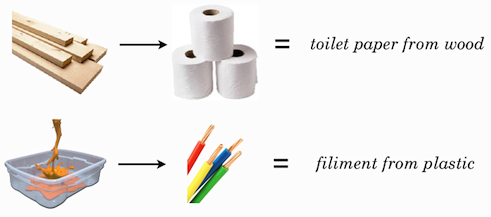Edit (due to changes in the OP's question):
The link J.R. supplies deals with the use of "made of" vs "made from." And that post links to an additional post, in EL&U, which also covers the same two expressions, "made of" and "made from." I would like to throw in another possibility, "made out of," which seems to combine "made of" and "made from." (out of can mean from or of, depending on context).
The Guardian's usage of 'made from' is correct and idiomatic:
TP is made from virgin wood. as is
TP is made out of virgin wood.
As far as TP is made of virgin wood, I agree that some speakers may find it problematic. But not so much that it is impossible to say. I think of can be interchangeable with from and out of in such constructions. In other words, I don't think of necessarily carries with it the meaning that the raw material is still present in its unchanged form.
TP is made of (virgin) wood. But (virgin) wood that has been changed. The bulk of my original answer deals with why it is okay to use virgin wood in such a construction.
of can have more than one meaning here, basically equivalent to from.
Did you know that TP is made of (virgin) wood? works in my world. But then, so does
I made this bag of my old jeans. To me of can carry the same genitival meaning as from or out of.
Original answer (answer to an earlier version of the question):
I suggest the OP is being overly-literal and overly pedantic in his definition of virgin wood.
Virgin wood is a type of wood.
Virgin wood
Virgin wood consists of wood and other products such as bark and sawdust which have had no chemical treatments or finishes applied.
Source: Biomass Energy Centre.
The same site says:
The wood processing industries, such as sawmills and timber merchants, are also a source of virgin wood in the form of offcuts, bark and sawdust.
In other words, virgin wood is wood from a forest that has not undergone chemical processing. This is different from other wood, which has already undergone some sort of chemical processing.
From the article:
More than 98% of the toilet roll sold in America comes from virgin wood, said Hershkowitz. In Europe and Latin America, up to 40% of toilet paper comes from recycled products.
It seems clear that the article is opposing virgin wood and wood that has gone through processing. Such could be recycled wood.
If the OP does not recognize that virgin wood (even after being cleared from a forest, sent to the sawmill, debarked, and planked) simply means wood from a forest, as opposed to processed wood, then I do not know what else to say. In that case, it appears the OP is playing 'a subtle, specious, or crafty argument' and the question is no longer one about English but about logic, specious or not.

